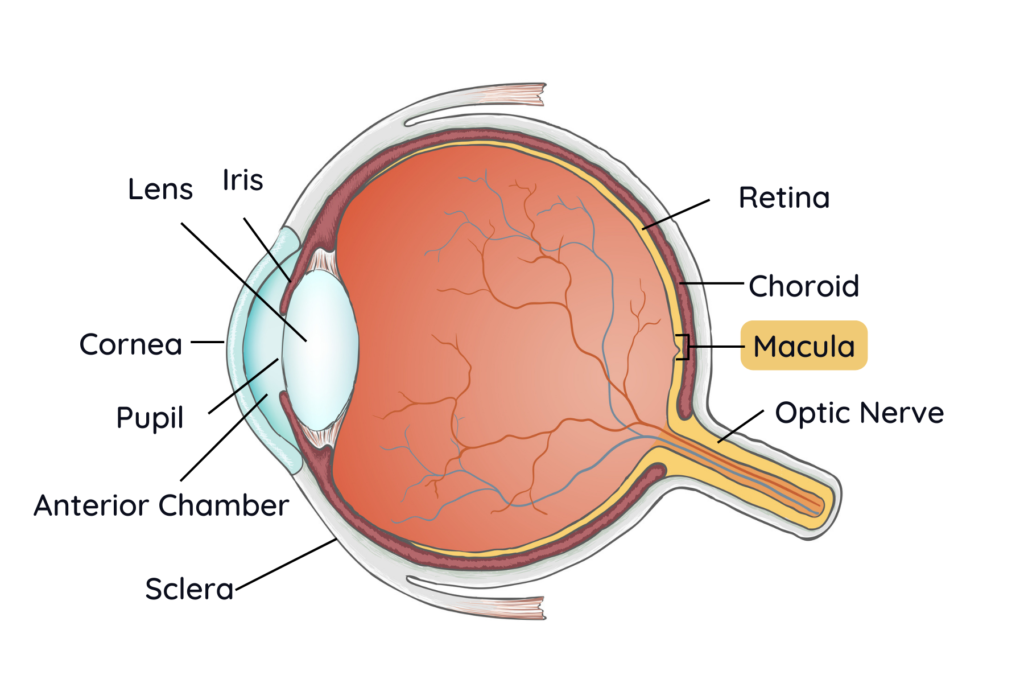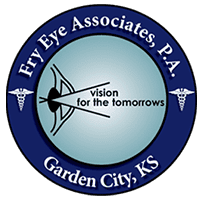Macular Degeneration
Age-related macular degeneration (AMD) is a leading cause of vision loss in the United States. Damage to the central retina from this condition can result in permanent loss of vision. To help you maintain your vision and eye health, the ophthalmologists at Fry Eye Associates offer comprehensive screening exams for the disease, as well as the latest prevention and treatment strategies.

More Macular Degeneration Resources
Macular Degeneration FAQ
Macular degeneration is a degenerative disease that affects the central part of your retina, known as the macula. The retina is the delicate layer found in the back of your eye that functions like the film in a camera, capturing and sending visual signals to your brain from the outside world. The central retina (macula) is what is responsible for giving you fine detailed vision.
As the macula degenerates the vision becomes affected, but in the earlier stages people often have no symptoms. For this reason, it is important to have regular eye exams. AMD may continue to advance until all central vision is lost. Vision loss and blindness as a result of macular degeneration cannot be reversed, but with proper recognition and treatment your risk for permanent loss can be reduced.
Learn more about macular degeneration here: https://www.aao.org/eye-health/diseases/amd-macular-degeneration
The greatest risk factors are increased age, a family history of the disease and smoking. It is also more commonly seen in Caucasians.
Dry macular degeneration is much more common than wet macular degeneration. Dry AMD refers to the form of the disease where the macula isn’t growing abnormal blood vessels and/or leaking blood products, unlike the wet form. Dry AMD generally does not damage central vision as severely as the wet form, but in more severe cases of the dry form, the central vision is still profoundly impacted. Due to the often-fast-moving nature of wet macular degeneration, it is extremely important to diagnose wet macular degeneration early and begin treatment before greater vision loss occur.
Currently there is no cure for macular degeneration, but there are treatments involving lifestyle changes and medical intervention that can treat certain forms of the disease and reduce the risk of profound vision loss.
Eating healthy and exercising can help slow the progression of AMD. Your doctor may recommend certain nutritional supplements with antioxidants, a common one being the AREDS2 supplement, that can strengthen the cells in your macula. If you smoke, quitting is the most important lifestyle intervention you can do to reduce your risk of severe disease.
Unfortunately, there is currently no medical treatment for dry macular degeneration. Lifestyle modifications and use of antioxidant supplements can help reduce vision loss in some patients.
For wet macular degeneration, there are medical interventions available that can stop the leaking blood vessels and even improve vision, such as:
- Anti-VEGF medication – a class of drugs that are injected into your eye. These drugs limit the production of VEGF (vascular endothelial growth factor), which is a protein that contributes to blood vessel growth. This can prevent more abnormal blood vessels from forming and can reduce the amount of abnormal blood vessels already present. Injections done at regular intervals determined by your ophthalmologist are usually necessary to prevent further retinal damage.
- Laser photocoagulation is a treatment that can directly target a leaking blood vessel. This is done in the doctor’s office without the need for more invasive surgery. Repeat treatments may be necessary to prevent further leakage and damage.
These treatments can slow the progression of the disease. Patients need several sessions of treatment and regular monitoring to continue to track progression of the AMD and slow vision loss. Our partnership with the expert ophthalmologists of Vitreo-Retinal Consultants Group from Wichita, Kansas allows patients to get much of their care in our Garden City clinic by these visiting physicians.
Schedule Your Visit
Our doctors are here to help address your concerns about your eyes and are experts in finding solutions that work best for you.



